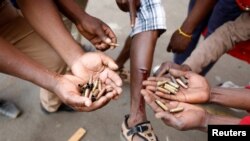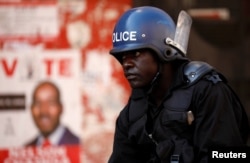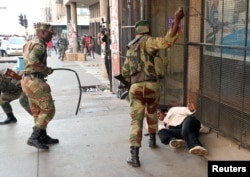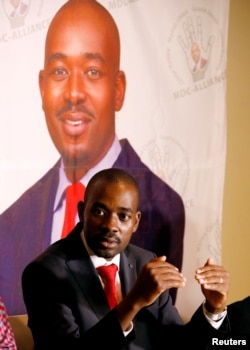Zimbabwean human rights activists on Thursday strongly condemned soldiers' actions in post-election violence that left at least six people dead and 14 wounded in Harare, the capital, as the nation's electoral commission promised that tensely awaited presidential poll results would be issued soon.
"There's absolutely no skulduggery or anything untoward happening," said Zimbabwe Electoral Commission chairman Emmanuel Magade, when asked why the results had not yet been announced. Legally, officials said, they have until August 4 to release results, and promised they would do so "very soon."
Opposition leader Nelson Chamisa held firm, just hours before the announcement was due. Chamisa maintained that he had won.
"You can't rig an election, or manipulate an election, and then use that as a basis of engagement," he said. "That's deceitful."
When asked what he would do if the results did not come out in his favor, he said, "We'll do a lot of things within the confines of legality and the constitution." When asked if he had had any contact with President Emmerson Mnangagwa, as the president indicated on Twitter, Chamisa denied it.
"There's no communication," Chamisa said.
The president's side also claimed victory.
"I know we have won the presidential election, but we will wait for the proper announcement of the results. Nevertheless, in the unlikely event that we do not win the presidential election, we will still request our supporters to accept the verdict of the people and allow Chamisa to take over," said Paul Mangwana, spokesman for the ruling ZANU-PF party led by President Mnangagwa.
Mnangagwa appeared to strike a conciliatory tone on Twitter, saying he would call for an investigation into the violence. In contradicting Chamisa, Mnangagwa also said, "We have been in communication with (presidential challenger) Nelson Chamisa to discuss how to immediately defuse the situation, and we must maintain this dialogue in order to protect the peace we hold dear."
On Wednesday, hundreds of angry Chamisa supporters thronged the election commission. Protesters threw rocks as police fired back with tear gas and water cannon. Later, army vehicles rolled through the streets, and soldiers were seen beating and shooting at pedestrians.
The streets of central Harare, usually a hive of activity and a snarl of traffic, were eerily quiet Thursday morning as soldiers and police manned them and told shopkeepers to close early and go home. Police also surrounded opposition headquarters in central Harare, ratcheting up the tension even more.
On Wednesday, police announced that they had called in the army to assist in keeping order, invoking the controversial Public Order and Security Act. That act was used during previous elections under the iron-fisted rule of President Robert Mugabe, who held power for close to 40 years before resigning late last year.
Activist Jestina Mukoko, director of the Zimbabwe Peace Project, described the soldiers' response to the protests as "outrageous."
"Reports indicated that the police were in control of the situation when military vehicles were observed driving into the central business district," she said. "Gunshots were fired randomly throughout the central business district, and forum observers witnessed soldiers randomly firing live bullets and beating up bystanders who were not involved in the protest. The military's conduct fell short of internationally accepted standards in controlling protesting crowds."
Lizwe Jamela of Zimbabwe Lawyers for Human Rights said the country's leadership needs to do more than make statements.
"What is needed is a commitment that what happened yesterday will never happen again," he said. "The statements may just be words loaded with promises, but the real issue is: what are they telling the soldiers that are on the street, what are they telling the police that are on the street in response to what is going to happen if citizens protest? What are the orders that are being given?"







